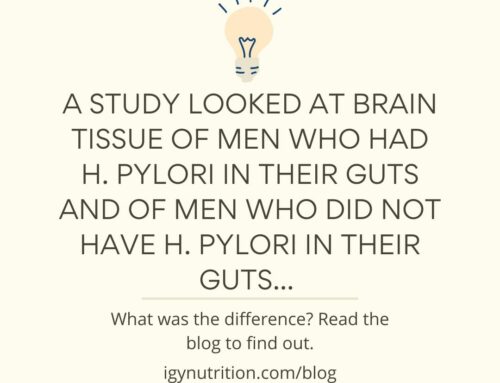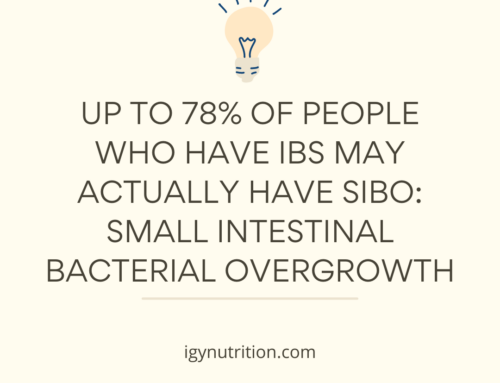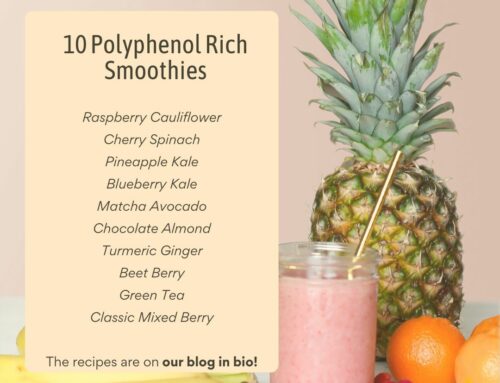Got a family member or friend with gut health issues? We’ve got you covered.
We’ve separated the gift ideas into three categories:
- Tools
- Tests and Healthcare Professionals
- Supplements
Read on for a long list of ideas for gut health supplements.
Digestive Enzymes and Stomach Acid Supplements
Do you have friends or family members with gut issues like bloating, gas, and irregular motility? They might want to try digestive enzymes and stomach acid supplements. Read on to find out why.
When you chew and swallow your food, its first stop is the stomach, where the food is broken down in preparation for absorption in the intestines (1).
Your stomach, a muscle, uses contractions to begin that process. But it needs a bit of chemical “umph” to get the job done: stomach acid (1).
Stomach acid is a mix of acids and enzymes that break down food into an absorbable form. Without it, we wouldn’t be able to use food for energy (2).
Low stomach acid can lead to a host of digestive symptoms. Check out our blog titled “Do you Have Enough Stomach Acid” to learn more.
Sometimes, consuming hard-to-digest foods can make the thorough breakdown of food challenging to achieve.
A small dose of digestive enzymes and stomach acid supplements before your meal may make breaking down food more manageable (3). These enzymes may prevent the gastric distress associated with poorly digested food.
If you think your family member or friend would like to try them, you’ll want to purchase high-quality stomach acid supplements and digestive enzymes.
If they need hardcore stomach acid support, check out the Spectrazyme Metagest by Metagenics. It contains potent pepsin and betaine HCl, which are critical components of stomach acid. You can purchase this on Amazon.
Metagenics’ Spectrazyme Pan 9x is a solid option for the three most important enzymes. It contains protease, amylase, and lipase, the enzymes needed to break down proteins, carbohydrates, and fats. It is also sold on Amazon.
Our favorite is Now Foods’ Super Enzymes. First off, it’s the most affordable. Second off, it contains a broad spectrum of enzymes, including amylase, protease, lipase, bromelain, papain, cellulase, ox bile extract, and betaine HCl.
If the gift-receiver struggles to digest gluten or dairy specifically, we recommend adding a digestive enzyme specified for gluten and dairy to the mix. The Pure Encapsulations Gluten/Dairy Digest is a solid option.
Tell your friend or family member to take the supplements with each meal or snack.
Glutamine
If your friend or family member struggles with gut issues – especially if they have a history of SIBO or dysbiosis – there’s a good chance they have some degree of a weakened gut lining (which is also called leaky gut syndrome).
And if that’s the case, there is one piece of information you should take away from this blog: glutamine is their friend!
Glutamine is an amino acid that is shown to:
- Significantly strengthen gut barrier integrity (4)
- Diminish sugar cravings (5)
- Support healthy metabolisms (5)
Scientific evidence suggests that consuming over 5g of glutamine per day helps repair the gut lining (4).
If you’re looking to pack an extra punch, many BCAA drinks contain high glutamine levels. Glutamine can also be added to drinks and smoothies, and it typically comes in powder form. Glutamine tastes pretty neutral, so there isn’t much to worry about when mixing it in beverages.
Glutamine and a shaker bottle or latte spinner make an excellent team for your gut-health gift.
Vitamins
Back on the topic of gut barrier integrity – vitamins do lots of heavy lifting when it comes to healing the gut lining. But consistently purchasing them can get expensive fast.
Gifting vitamins can save your friend or family member some money, and it lets them know you’re supportive of their gut health journey.
Three vitamins are essential for gut barrier integrity: omega 3, zinc, and vitamin D.
Omega 3 vitamins are valuable for decreasing inflammation in the gut and improving microbiome composition, which are potential root causes of leaky gut syndrome (6, 7).
1000 mg of omega 3 vitamins is the daily recommended dose.
Zinc is also incredibly valuable for immune and gut health. It is often recommended for those with colitis, Crohn’s disease, dysbiosis, SIBO, parasitic infections, or other gut issues because of its contribution to repairing the gut lining (8).
Lastly, vitamin D is a crucial player. Some scientists believe a deficiency in vitamin D may even cause leaky gut syndrome – so making sure you’ve got enough vitamin D is key to overcoming the syndrome (9, 10).
Vitamin D gets a 5-star rating with gut health. Evidence asserts that it decreases inflammation, upregulates beneficial bacteria, improves food breakdown and absorption, and repairs gut lining.
If your friend or family member is not interested in stomach acid supplements, enzymes, glutamine, or vitamins, don’t worry – we’ve got you covered.
Check out part four for supplements that combat dysbiosis: probiotics, prebiotics, and IgY Max.
References
- https://www.sciencedirect.com/topics/immunology-and-microbiology/digestion
- https://www.sciencedirect.com/topics/veterinary-science-and-veterinary-medicine/gastric-acid
- Ianiro G, Pecere S, Giorgio V, Gasbarrini A, Cammarota G. Digestive Enzyme Supplementation in Gastrointestinal Diseases. Curr Drug Metab. 2016;17(2):187-193. doi:10.2174/138920021702160114150137 https://www.ncbi.nlm.nih.gov/pmc/articles/PMC4923703/#:~:text=Digestive%20enzymes%20are%20able%20to,lactose%20intolerance%20to%20cystic%20fibrosis.
- Wang B, Wu G, Zhou Z, Dai Z, Sun Y, Ji Y, Li W, Wang W, Liu C, Han F, Wu Z. Glutamine and intestinal barrier function. Amino Acids. 2015 Oct;47(10):2143-54. doi: 10.1007/s00726-014-1773-4. Epub 2014 Jun 26. PMID: 24965526. https://pubmed.ncbi.nlm.nih.gov/24965526/#:~:text=Furthermore%2C%20glutamine%20stimulates%20growth%20of,essential%20amino%20acid%20for%20adults.
- Jafari-Vayghan, H., Varshosaz, P., Hajizadeh-Sharafabad, F., Razmi, H. R., Amirpour, M., Tavakoli-Rouzbehani, O. M., Alizadeh, M., & Maleki, V. (2020). A comprehensive insight into the effect of glutamine supplementation on metabolic variables in diabetes mellitus: a systematic review. Nutrition & metabolism, 17, 80. https://doi.org/10.1186/s12986-020-00503-6 https://www.ncbi.nlm.nih.gov/pmc/articles/PMC7517657/
- Costantini L, Molinari R, Farinon B, Merendino N. Impact of Omega-3 Fatty Acids on the Gut Microbiota. Int J Mol Sci. 2017 Dec 7;18(12):2645. doi: 10.3390/ijms18122645. PMID: 29215589; PMCID: PMC5751248. https://pubmed.ncbi.nlm.nih.gov/29215589/#:~:text=Finally%2C%20human%20and%20animal%20studies,microbiota%20emerges%2C%20encouraging%20further%20studies.
- Marton LT, Goulart RA, Carvalho ACA, Barbalho SM. Omega Fatty Acids and Inflammatory Bowel Diseases: An Overview. Int J Mol Sci. 2019 Sep 30;20(19):4851. doi: 10.3390/ijms20194851. PMID: 31574900; PMCID: PMC6801729. https://pubmed.ncbi.nlm.nih.gov/31574900/#:~:text=The%20results%20showed%20that%20%CF%893,of%20life%20of%20CD%20patients.
- Sturniolo GC, Fries W, Mazzon E, Di Leo V, Barollo M, D’inca R. Effect of zinc supplementation on intestinal permeability in experimental colitis. J Lab Clin Med. 2002 May;139(5):311-5. doi: 10.1067/mlc.2002.123624. PMID: 12032492. https://pubmed.ncbi.nlm.nih.gov/12032492/
- Singh P, Rawat A, Alwakeel M, Sharif E, Al Khodor S. The potential role of vitamin D supplementation as a gut microbiota modifier in healthy individuals. Sci Rep. 2020 Dec 10;10(1):21641. doi: 10.1038/s41598-020-77806-4. PMID: 33303854; PMCID: PMC7729960. https://pubmed.ncbi.nlm.nih.gov/33303854/
- Fakhoury HMA, Kvietys PR, AlKattan W, Anouti FA, Elahi MA, Karras SN, Grant WB. Vitamin D and intestinal homeostasis: Barrier, microbiota, and immune modulation. J Steroid Biochem Mol Biol. 2020 Jun;200:105663. doi: 10.1016/j.jsbmb.2020.105663. Epub 2020 Mar 16. PMID: 32194242. https://pubmed.ncbi.nlm.nih.gov/32194242/




